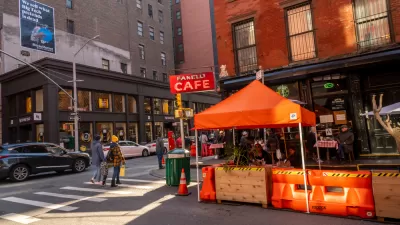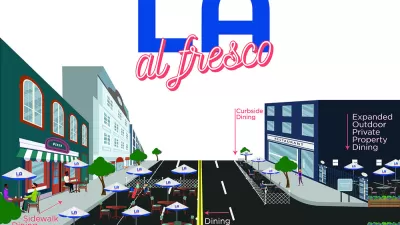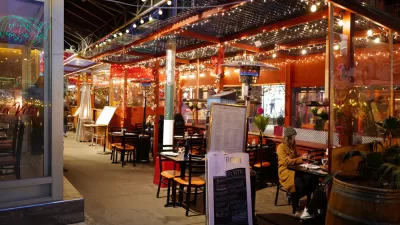The city's new regulations pave the way for making the pandemic experiment a permanent fixture.

As Lori Weisberg reports, the San Diego City Council approved new regulations that will make permanent the city's outdoor dining program, started during the pandemic to support struggling restaurants as COVID-19 forced businesses to adjust to social distancing guidelines. The program "will allow restaurant owners to extend their outdoor seating onto sidewalks, and in metered and unmetered parking spaces in front of their venues as long as they pay a fee, a requirement that up until now has not been imposed."
The new program, called Spaces as Places, will start next July and "include a number of design and safety regulations that will permit restaurants to install platforms for seating along unpainted, yellow or green curbs as long as they are at least 20 feet away from an intersection, street corner, alley or driveway." The new regulations only permit outdoor dining on streets with a maximum speed limit of 30 miles per hour.
Repurposing curb space and parking lots for outdoor dining has become a hallmark of the COVID-19 pandemic as restaurants looked for creative ways to continue serving customers. Cities all over the U.S. scrambled to implement outdoor dining regulations and permitting. Now, as the pandemic and temporary outdoor dining programs wind down, city leaders must decide on the future of 'al fresco streets.'
FULL STORY: Like dining in the street? San Diego decides to make pandemic experiment permanent for restaurants

Trump Administration Could Effectively End Housing Voucher Program
Federal officials are eyeing major cuts to the Section 8 program that helps millions of low-income households pay rent.

Planetizen Federal Action Tracker
A weekly monitor of how Trump’s orders and actions are impacting planners and planning in America.

Ken Jennings Launches Transit Web Series
The Jeopardy champ wants you to ride public transit.

Crime Continues to Drop on Philly, San Francisco Transit Systems
SEPTA and BART both saw significant declines in violent crime in the first quarter of 2025.

How South LA Green Spaces Power Community Health and Hope
Green spaces like South L.A. Wetlands Park are helping South Los Angeles residents promote healthy lifestyles, build community, and advocate for improvements that reflect local needs in historically underserved neighborhoods.

Sacramento Plans ‘Quick-Build’ Road Safety Projects
The city wants to accelerate small-scale safety improvements that use low-cost equipment to make an impact at dangerous intersections.
Urban Design for Planners 1: Software Tools
This six-course series explores essential urban design concepts using open source software and equips planners with the tools they need to participate fully in the urban design process.
Planning for Universal Design
Learn the tools for implementing Universal Design in planning regulations.
Heyer Gruel & Associates PA
Ada County Highway District
Institute for Housing and Urban Development Studies (IHS)
City of Grandview
Harvard GSD Executive Education
Toledo-Lucas County Plan Commissions
Salt Lake City
NYU Wagner Graduate School of Public Service





























